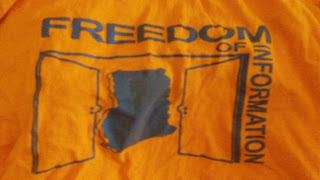Yesterday morning I arrived at work at the Human Rights Advocacy Center, expecting to spend the day researching cases and meeting with clients. However, upon my arrival, I was handed a neon-orange shirt sporting the slogan, “Pass the Right to Information Bill Now” and informed that the office was to attend a demonstration at the Ghanaian Parliament.
The Right to Information Bill was proposed in Parliament one year ago, yet remains a bill instead of a law. It mandates that government records be open to their citizens (who elected the government, after all). This bill would make great strides in eliminating much of the corruption that is currently rampant in Ghana, as in many African countries. I was very proud to be part of a crowd demonstrating in favor of such a critical issue, while pointing out the corruption that has led to the inactivity of this bill.
We took a trotro to a park near our destination and joined the growing numbers of orange-shirt-wearers. I picked up a sign that said “No FTI = More Corruption!” and marched down the street to Parliament. When we got outside of the Parliament building, however, the armed guards would not let us in. While some members of the group reasoned with the police, the rest of us stood on the sidewalk outside for around an hour, watching cars, trotros, and large groups of people on foot being admitted onto the grounds. Finally, the executive director of the HRAC, Nana, arrived. Nana is a powerful woman and a well-known activist. Her very presence leaves me with a feeling of empowerment and determination.
So when Nana drove up, we knew that things would get going. She wondered what was wrong—why were we not in the grounds? When someone informed her of the situation, she shook her head and beckoned for us to follow her. Nana confidently strolled over to the gate, and she too was blocked by the police.
Upon Nana’s instruction, we formed a line in front of the line of the police officers. Our demonstrators stood strong and silent, nose-to-nose with the AK-47-toting Ghanaian police. We held our picket signs and looked at the guards. Suddenly, with no warning and all at once, the police forcibly pushed the crowd back, sending demonstrators flying, falling over each other and yelling. I was shoved backwards until I tripped over a wheelchair whose passenger had been thrown from it. Wooden signs were flung everywhere as bodies were thrown onto the ground.
When the chaos subsided, I was able to pick myself up and saw that the guards had shut the iron gates, locking us out of the compound. They maintained a line behind the door, laughing at us and miming shooting at us with their AK-47s. The demonstrators held our signs against the gate and chanted in protest. Media vans started arriving, snapping pictures and video and interviewing Nana and the demonstrators.
A couple of hours later, reinforcements came in the form of energetic Ghanaian men with drums. They stepped out of their trotro and the music grew. They began singing along to their rhythms and the crowd joined in, dancing and chanting for the guards to see. I found myself remembering the American hippies who gave flowers to policemen, yet were still beaten down and remained unheard.
We remained outside for another few hours before finally dispersing. As horrifying as the events of the day were, even more disturbing is the fact that this event will go unpunished and unrecognized by the majority of the world. We will go back again next week, and the week after, and for weeks after that one, if that is what it takes for justice to be achieved.






No comments:
Post a Comment